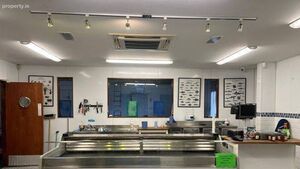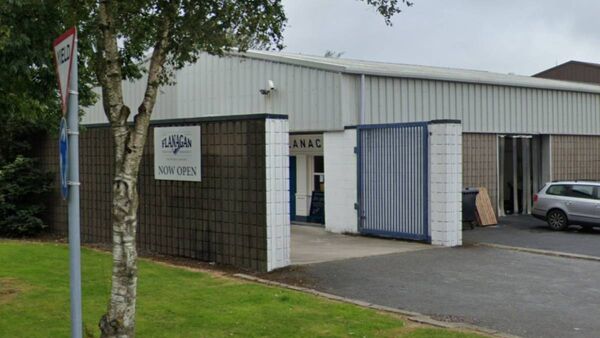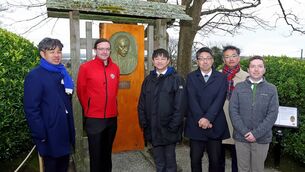Popular family-run fish shop closes its doors after 100 years

Popular family-run fish shop closes its doors after 100 years
The renowned Waterford fish merchants Flanagan’s has closed.
Flanagan’s premises at Unit 603, Northern Extension Industrial Park, Cleaboy Road, Waterford, was recently placed onto the rental market.
A sign erected outside the premises says, “We regret to announce that the business of M.J. Flanagan is now closed.
“We would like to thank all of our customers for their support over the years.
“We hope that you have enjoyed your shopping experience with us and that our products have met all of your requirements.
“We wish all of our customers the very best for the future. From management and staff of Flanagan’s.”
According to Bord Iascaigh Mhara, Flanagan’s was founded by Martin J Flanagan over 100 years ago, and remained a family business with John Flanagan and his brother Brendan at the helm.
GMC Auctioneers recently listed their 3,200 square feet premises, offered at an annual rate of €26,000 (or €2,167 per month). The site contains former Flanagan’s amenities, including cold rooms, wash-down drains, a shop area, office spaces, goods in/goods out facilities, a loading area, yard, parking and a production area.
The Flanagan family had a number of stores situated in Waterford City, before locating to their site in the Northern Extension Industrial Park.
Speaking to the Waterford News & Star, local councillor John Hearne fondly recalled his days as a fisherman in his youth, reflecting on the invaluable lessons and memories forged in Flanagan’s stores.
“In my life, Flanagan’s was the most loved shop I was ever in,” Cllr Hearne said.
“When I was young, I had a lobster boat and I used to drop all the lobsters into Flanagan’s. I loved the place.” He added, “When I went in as a teenager. I used to see all these men in the shop selling salmon, I was enthralled with the place.
“They were great people, a really great outfit, and much loved.” Cllr Hearne added that Flanagan’s shops in Waterford became a communal hub for fishermen and the local community.
“On Saturday’s everyone went into Flanagan’s,” he said. “We worked all week, then we went down to Flanagan’s to do business.
“It was the heart of Waterford on Saturdays. They paid you well and looked after you. They were really nice guys and it was a really great time.” Cllr Hearne added that Flanagan’s management and staff epitomized local community spirit.
“Flanagan’s used to pay for people’s salmon license and lobster pots, and when people didn’t have a pound, they would give them loans to get them going,” he said.
“The place was all about community. Flanagan’s looked after the fishermen, and the fishermen looked after Flanagan’s. It was an old type of community that is no more. It was a genuine old school place that lifted you up and looked after everyone. They were lovely people.
“It really was warm and welcoming there, a great thing for the county. They did everything they could to keep the fishing industry on good footing in Waterford.” Flanagan’s premises at Unit 603, Northern Extension Industrial Park, Cleaboy Road, Waterford.

Before his conversation with the Waterford News & Star last week, Patrick Murphy, CEO of the Irish South & West Fish Producer’s Organization, had just returned from a meeting in Paris concerning Ireland’s fishing industry and its connections with Europe.
He said: “We discussed the same as we do every year here; a rollback on the craziness of the scientific advice and the legislation that is coming down on top of us.” Speaking further on the problems facing long serving fish mongers in the south east and across the country, Mr. Murphy added, “Supply would be the main reason why a lot of fishmongers go out of business. They just can’t get a regular supply of fish which is locally harvested, at the right price for them to be able to sell.
“The reason for that is because we don’t have enough fish in our own waters,” he added, “And because we don’t have enough fish in our waters, there’s not enough spillover into the fishmongers or fish shops, so they have to get them by other means that are more constant and expensive.” Because of legislative measures impacting Ireland’s fishing sector, Mr. Murphy contends that it has become less appealing for young people to enter. Resultingly, a lack of fishing vessels on local waters is impacting supply to local stores.
“In 2004 we had 400 licensed boats which were over fifteen metres on our fishing register to catch fish on Irish waters. We’re down to just over 120 now. The rights to catch fish have been extinguished for future generations, and we can never get them back.
“And the knock on effect is for the people in fish shops,” he added, “All these people want to do is get product, put it on a shelf and sell it to anyone who comes in. But they can’t do that because of what is happening.
“Fishing in Ireland isn’t run by big corporations,” he said, “It’s run by generations of families, who spend a lifetime gathering up enough money to get safe boats to go to sea. And something is wrong with that picture when someone strives all their life to be successful and then somebody else takes it away from them.”






